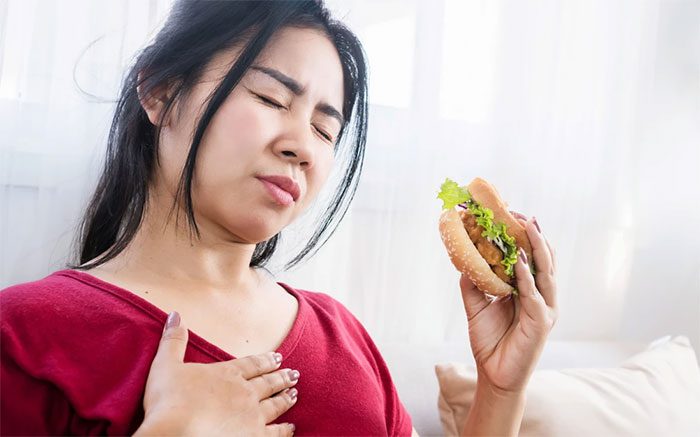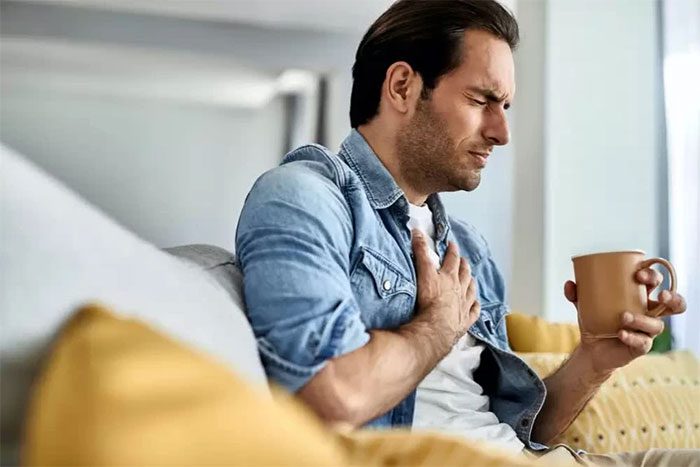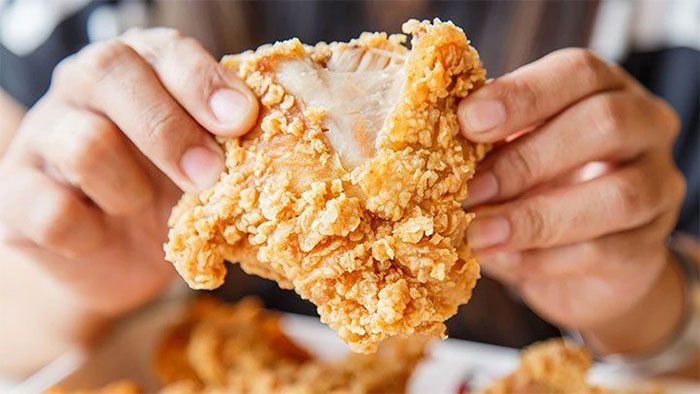Heartburn is often more severe after meals. To alleviate this symptom, pay attention to your food choices, resting habits, and several other factors.
What You Need to Know About Heartburn
Heartburn is a common condition, especially after consuming spicy foods or a heavy meal. About 1 in 10 adults experience acid reflux at least once a week. However, if you experience heartburn more than twice a week, you may be suffering from a more serious condition known as Gastroesophageal Reflux Disease (GERD).
1. Why Do You Experience Heartburn After Eating?
When you swallow, food travels down your throat and through the esophagus to your stomach. The act of swallowing causes the muscle that controls the opening between the esophagus and stomach, known as the lower esophageal sphincter, to open, allowing food and liquid to enter your stomach. Otherwise, the muscle remains tightly closed.
If this muscle does not close properly after swallowing, stomach acid may flow back into the esophagus. This is known as “reflux.” Sometimes, stomach acid reaches the lower esophagus, leading to heartburn.

When swallowing food, if the lower esophageal sphincter does not close properly, it can cause heartburn. (Image: Internet).
2. Tips to Reduce Heartburn After Meals
Heartburn after eating can cause discomfort and irritation in the throat. To alleviate heartburn symptoms after meals, consider the following tips:
Sit for at least 30 minutes after eating
“Stretched skin, droopy eyes” – after meals, we often feel sleepier. However, sleeping right after eating can trigger or worsen heartburn.
If you feel sleepy after a meal, continue to move around for at least 30 minutes. You might wash dishes or take a short evening walk.
It’s especially important to have dinner at least 2 hours before going to bed and to avoid snacking right before bedtime.
Wear loose-fitting clothing
Tight-fitting clothes or belts can put pressure on the stomach, leading to acid reflux. Therefore, after a meal, you should loosen tight clothing or change into more comfortable attire. This simple tip can be very helpful in reducing symptoms of bloating and heartburn.
Avoid smoking and drinking caffeinated beverages afterward
Smoking after meals may be a habit for many, but it can cause heartburn by relaxing the muscles that typically prevent stomach acid from flowing back into the throat.
Additionally, after meals, when body temperature rises, smoking inhibits the secretion of essential proteins and bicarbonate, hindering food digestion and nutrient absorption. It can also cause direct damage to the stomach and duodenum, disrupt digestion, increase bile secretion, and lead to abdominal pain and other symptoms. Moreover, the body actively absorbs the process of food digestion, while the absorption of cigarette smoke is also enhanced, increasing harmful substances.
Caffeine negatively affects the function of the lower esophageal sphincter and exacerbates heartburn.

Drinking caffeinated beverages affects the function of the lower esophageal sphincter and exacerbates heartburn (Image: Internet).
Elevate the head of your bed
If sitting or engaging in light activity for 30 minutes to an hour after eating still results in heartburn when lying down, you should elevate the head of your bed by about 10-15 cm.
When the upper body is raised, gravity makes it less likely for stomach contents to reflux into the esophagus. It is important to note that you should actually raise the bed and not just use extra pillows. Using additional pillows can put your body in a bent position, which may increase pressure on the stomach and worsen heartburn symptoms and reflux.
You can elevate your bed by placing sturdy wooden blocks that are 10 to 15 cm under the two legs at the head of the bed. These blocks can also be inserted between the mattress and box spring to elevate your torso from the waist up.
Try not to bend over
Your posture can also contribute to heartburn. If you are bending over, try to sit up straighter. A 2021 case study showed that long-term postural issues could contribute to gastroesophageal reflux. In this study, correcting poor posture eliminated reflux symptoms.
Pay attention to your food choices
A diet high in fat can also prolong and worsen heartburn symptoms, so meals low in fat or containing healthy fats are ideal.
You should limit processed and greasy foods such as fried items, pizza, fatty meats like bacon and sausage, and cheese. Additionally, avoid spicy and acidic foods such as citrus fruits.
Instead, opt for high-fiber foods (whole grains, sweet potatoes, carrots, asparagus, broccoli, etc.), alkaline foods (bananas, melons, cauliflower, nuts), and hydrating foods (celery, cucumbers, lettuce, watermelon).

Avoid foods high in fat. (Image: Internet).
Drink ginger tea
Ginger tea, which contains gingerol, can help improve digestion after meals and reduce pressure on the lower esophageal sphincter. Tasty and caffeine-free, ginger tea is an excellent choice after meals to alleviate symptoms of heartburn, nausea, and bloating.
You can buy pre-made ginger tea or crush a piece of fresh ginger, boil it in water, and add a bit of sugar if desired for enjoyment.
Use medication
If heartburn symptoms become severe and affect your quality of life, such as causing insomnia, you may need to use additional medication for control.
Some of the most commonly used medications to reduce heartburn include:
- Alka-Seltzer (calcium carbonate antacid)
- Maalox or Mylanta (aluminum and magnesium antacid)
- Rolaids (calcium and magnesium antacid)
More severe cases may require prescription-strength medications, such as H2 blockers and proton pump inhibitors (PPIs), to control or eliminate stomach acid.
In general, when using medications, you need to follow the type and dosage prescribed by your doctor and not self-medicate without guidance.
3. When Should You See a Doctor?
If your heartburn is severe or occurs frequently, you should see a doctor for an examination. In some cases, heartburn symptoms may be due to gastroesophageal reflux disease (GERD) and may require medication treatment.
Additionally, heartburn and heart attack can have similar symptoms, such as chest pain. If you do not have other distinctive symptoms of heart disease, you should consult a doctor for advice and to identify the cause.


















































